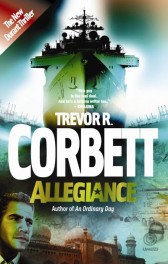Allegiance by Trevor R Corbett. Umuzi, 2012
Over the past few years, SA writers like Margie Orford, Deon Meyer, Mike Nicol and Roger Smith have found wide purchase with works identifiable, in some way, as “crime novels” set in South Africa. However, little about this genre in its local habitation, or its likely writers, is predictable, and so it is entirely unsurprising that Trevor R. Corbett, a counter-intelligence strategist for the State Security Agency, has also joined the fray.
Corbett holds an honours degree in criminology, and Allegiance is his follow-up to a good debut entitled An Ordinary Day. Corbett’s debut set the focus on weapons procurement, while here a State Security agent, Kevin Durant, along with partner Cedric Shabalala, must get to the bottom of a terrorist threat.
A state-of-the-art US warship, the USS Endeavour, docks in Durban’s harbour, carrying the US Assistant Secretary of State. This brings a host of role-players into the equation, including philanthropist Sheik U-Haq, founder of the Islam Africa Centre. As the possibility of Islamist extremism in Durban looms, the stage is set for a race-against-time scenario where very little is as it seems to be.
The clandestine entry of a Pakistani national at the start of the novel holds the key to this gripping work of fiction, which quite surpassed my initial expectations.
SA crime fiction readers might be tempted to draw comparisons between Corbett’s new novel and recent works by Deon Meyer, Andrew Brown and Chris Marnewick.
Meyer’s Trackers also deals with the lives of secret agents and a terrorist scare in the build-up to the 2010 Soccer World Cup, while Andrew Brown examines religious fundamentalism in Solace. Marnewick straddles the line between fact and fiction in most of his work, especially The Soldier Who Said No and A Sailor’s Honour, both of which use fictional licence to focus on particular moments in SA history. Corbett, in his turn, lifts the veil on the securocrats and the spies, subjects who have hitherto received very little attention from SA writers.
Corbett’s narrative presents a host of clandestine operations which include murder, blackmail, money laundering, drug smuggling and human trafficking. As the plot moves back and forth, carefully conceived details first appear and are often revisited at a later stage to illuminate or amplify the significance of key moments and events.
Such details include the shooting of Durant early in the narrative, the mystery behind the disappearance of his partner Shabalala every Wednesday evening, and the truth about the eventual bombing of the USS Endeavour. The cumulative effect is dazzling – some readers might find Corbett excessive in the way he mounts one thrill on top of another.
Allegiance grounds its story in to-the-point descriptions that alternate with more expansive moments of cogitation. The novel’s blend of action, reflection, intrigue and revelation is watertight and carefully rendered, but not at the cost of character development. This is certainly one of the ways in which Corbett continues to distinguish himself as a writer: he has a knack with plots and characterisation.
The characters in Allegiance are, for the most part, well realised. Family-man Durant and meticulous, by-the-book germophobe Shabalala play off each other as opposites: rough and ready Durant is battle-hardened, while Shabalala is reticent and uneasy.
Corbett’s extensive work in the field and first-hand knowledge of South African security protocol make him a good candidate to weave into fiction real-world fears and inchoate threats. Red herrings feature, but never dominate this crafty novel, and the story seldom gets too clever for its own good. Corbett’s pacing is even-handed and assured.
In addition, there is little to suggest that Corbett wants to use his novel as a platform to push a conservative or radical political agenda. Allegiance is commendable for not pandering to exaggeratedly shrill, middle-class fears about “crime”.
Parts of the novel’s middle section walk a tightrope between tedious familiarity and genuine immersion, but on the whole Corbett’s Allegiance finds a balance between escapism, entertainment and education.
 SLiPStellenbosch Literary Project
SLiPStellenbosch Literary Project 